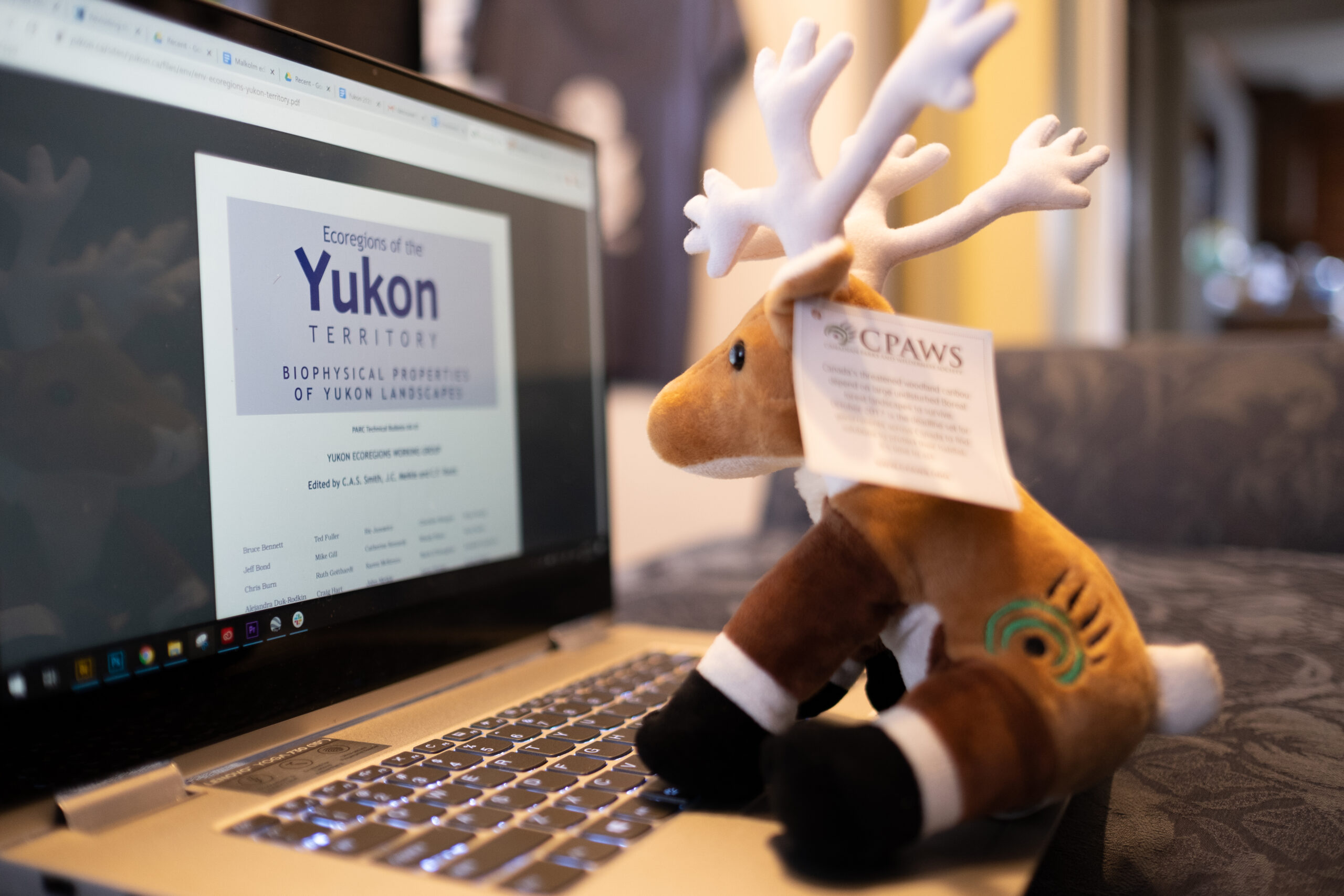
Conservation from the Couch
An abridged version of this was published in What’s Up Yukon
Written by Randi Newton, Conservation Manager
Like many Yukoners, physical distancing meant I spent a lot more time than usual at home this spring. One of my highlights was catching up with local films on the Yukon Film Society’s streaming website, Available Light on Demand.
I was spellbound by Camera Trap, a short documentary that follows photographer Peter Mather as he tries to capture the perfect photo of the Porcupine caribou herd. Peter uses storytelling to advocate and inspire others to stand with the Gwich’in people and protect the herd’s migration route and calving grounds.
Watching Peter lug a heavy pulk across miles of soggy snow and carry expensive camera gear across streams of slippery snowmelt made my lazy evening on the couch feel even cushier. The end of the film shows the incredible images he was able to capture that will surely inspire conservation action.
As a teenager, I remember reading National Geographic and being inspired by similar stories of epic journeys in the name of conservation. Now I work for a conservation organization, and my typical journey is far from epic. Usually it’s from home to office and back, with an occasional stop at the grocery store. Lately my commute has been even shorter, from the kitchen to my laptop at the dining room table.
Even if you can’t undertake a marathon trek across the tundra, you can still support conservation. Writing letters and filling out engagement surveys are incredibly valuable. I call this “conservation from the couch”. These types of actions have advanced conservation efforts across the globe, including protection of the Porcupine caribou.
Two winters ago, oil exploration company SAExploration wanted to conduct an intrusive seismic survey in the Arctic National Wildlife Refuge. The Gwich’in Steering Committee and the Sierra Club led a campaign in opposition to the oil surveys, and inspired over 250,000 people to make phone calls or send emails to SAEx. Bernadette Dementieff of the Gwich’in Steering Committee joined local activists to hand deliver boxes upon boxes of letters to SAEx’s headquarters in Houston, Texas. The thousands of calls, emails, and letters – all part of conservation from the couch – had a large collective impact. Public opposition and SAEx’s legal difficulties have succeeded in keeping seismic exploration out of the Arctic Refuge.
You don’t need to be an “expert” to advocate for issues that you care about. It can be intimidating if you don’t know exactly what to say but this shouldn’t stop you. The important thing is to tell your story, why you care, and what you hope to see. You don’t need to know all the policy jargon, or have navigated the regulatory spider web. For example, thousands of people called to “Protect the Peel”, and wrote why this was important to them. That was enough. Policy makers then translated this call for action into policy (if you’re curious, it translated to designating land management units in the Peel Watershed as Special Management Areas).
Of course, not everyone has time to draft up a personal response. People are pulled in many directions by everything else going on in the world. Because you may be pressed for time, many organizations, including the team at CPAWS Yukon, often provide template letters that you can sign and send in. Decision makers may not weigh these types of responses as strongly as personal letters but will still see that you care about an issue. One way you can have more impact is to use the template letter as a starting point and add your own message.
Feeling ready to flex your conservation from the couch muscles? Right now you can provide input on the Yukon Mineral Development Strategy, a strategy that could modernize mineral exploration and development in the territory. Because these practices touch so many facets of life, this is really a chance to have your say in what the Yukon’s future should look like.
If you’ve ever thought that some things about mineral development in the Yukon need to shift, this is your opportunity to say so. That might include modernizing our mining legislation, putting a pause on mineral staking when land use planning is underway, or ensuring that mining aligns with the Yukon’s commitments to climate action and biodiversity conservation. Mining issues related to social justice and public health may also be on your mind. If you’re interested, CPAWS Yukon created a list of seven recommendations for the strategy, available at https://cpawsyukon.org/yukon-mds/. You can read them from your couch and, if they resonate with you, use them as a starting point to write your own submission.
Remember, you don’t need to be an “expert”. You are the expert when it comes to your concerns, your values, and the future you want to see.
